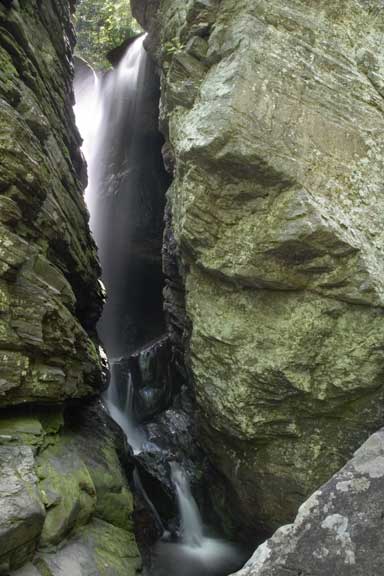This is the third installment of a series about water. Click here for the introductory entry. As always, if you are inspired to contribute some of your own writing as we go along, I would be delighted.
I took a road trip from Michigan to Georgia with my mother in 2014, and along our journey through the Appalachian mountains we had a series of encounters with waterfalls that left me forever changed. I believe I never understood or even fully believed in the Holy Spirit until I had drawn near to these waterfalls. During the following semester at seminary—which was my last—I replaced going to church on Sunday with hiking to different waterfalls within driving distance of Atlanta. The following six-part poem reflects one of these Sunday “worship services” in the woods of Northern Georgia, exploring what we can learn from water—about our essential nature, about our bodies and their goodness as well as their limitations, about God, and about love.
Raven Cliff Falls
I.
Just by flowing down, water carves away
at the stagnate structures
of million-year-old stone
and makes new shapes:
smooth curves, round cubbyholes, deep pools.
It makes a way out of no way.
But first it makes its peace with structure,
no matter how constraining it is.
And it takes a very, very long time.
Which is stronger: water or stone?
II.
Sometimes humans make
beautiful things
without harming anyone:
stones in the middle of water
piled up very carefully,
as if they were sitting and thinking,
balanced so precariously
but never falling over.
They startle the landscape,
and take away nothing at all
from the harmonious order of things.
III.
The ferns! The ferns
are so soft that I want
to lie down and make my bed of them
even if I get wet—
because everything is always wet—
alongside my love forever,
sighing in each other’s arms.
Ours is a forbidden love,
that flows in torrents against
what I think
are good sound structures
for my life.
All true love is forbidden.
IV.
On top of a dizzying cliff,
like God’s rough finger
jutting out of the earth
with a flat callous at the tip,
I imagine a monk
should meditate here.
The water rushes down around us
but we cannot see it;
we can only imagine it tickling
the crevice of God’s hand.
I say “we” because
there are two insects that look like giant bees
lying on their sides at the base of a spindly tree,
heads locked in a frenetic, passionate embrace.
Their countless little limbs
swinging spinning interlocking
faster than my own ten fingers can move,
as if they wanted to devour each other’s
little black and yellow faces.
And as I watch them I start to think
that their heads really are beautiful,
desirable, at least if I were one of them.
And I want to cling to my love like that,
to grab at his face, his skin, his limbs
until he leaves what I’m hungry for stuck to my body;
or whatever it is that giant bees do
when they love each other.
V.
I have fear in my body
when I try to head back down
the steep rocks and roots and slippery mud.
I am afraid of falling.
I think about how I move
and how I hold myself still.
I am proud that I have not fallen,
but the sad secret is this:
I do not move with grace.
I don’t let myself move too much at all.
A jerk in my neck, a jerk in my hips,
a stiffness I never really let go of,
and I make my way, all right, as I fight
against form and flow.
How would water do this?
And finally, when I am almost to the flat land,
I set my foot where I know I shouldn’t—
my one feeble dare—
and I slide into mud, scrapes and bruises,
embarrassed and defeated.
VI.
I decide not to wash
the swaths of mud off my legs,
not even in the soft ferns.
Let them think what they will
when they see me hiking back.
The secret that only God knows is this:
I am made wholly of water.